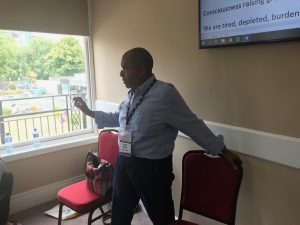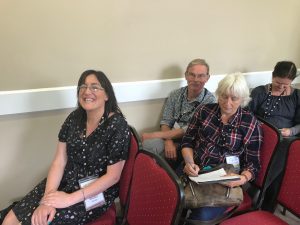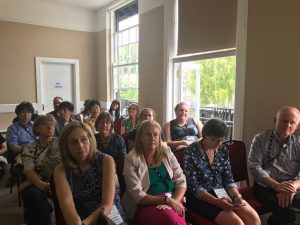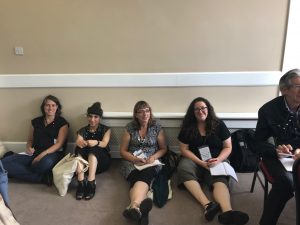Thank you to all who attended!




Notes from the 2018 July 5 workshop, SWSD2018, Dublin, Ireland
Because the discussion in the workshop is where ideas and solutions are generated. This is my (Diane Holliman’s) summary of the points made by the participants in the workshop. Feel free to email me (dhollim@valdosta.edu) with your feedback and responses to these. I’d love to hear from you and I will include your comments, suggestions, questions and more in the blog.
- Social workers may be tired, depleted, consumed, exhausted, burdened-just like the earth. A way to care for ourselves is to advocate-join with others to address these problems. Self care starts with ourselves. How can we care for ourselves and care for the earth?
- Indigious people have done for this centuries—not used products that were costly to the environment. Indiginous people have reduced what they used, recycled, re-used. The modern and capitalistic era brought us items for “convenience”—fast foods, plastic cups, plastic bottles, cars and more . . . . In the 20th century there was a concerted movement by the capitalists to introduce these items and for people to think these were things they needed for the “good life.” We thought we needed these things to throw away after we used them and then we would buy the items again. It is important for social workers to call out these problems as being created and exacerbated by capitalism.
- Climate change issues are micro (grief-missing environmental beauty and resources of the past and we see loss of physical environments), mezzo and macro. We need macro action, political action, policy action. We need policy practice to promote policies throughout the world to protect and preserve our environment.
- We need political action-Protesting and talking and art make no difference if we don’t vote
- Social workers must be strategic in how they address climate change—not fragmented-a concerted effort.
- We (Social Workers) need to organize and vote. This may mean stepping out of our comfort zones. Many social workers are at their jobs all day, may be too tired to meet with others to advocate for climate change after doing their jobs.
- Go beyond our neoliberal job descriptions-it is about how we support the mission of the profession not so much the mission of the organization. Preserving each other and the environment are parts of our mission as social workers.
- It is important that we Acknowledge this loss, loss of the coral reef and our temperate planet and that we grieve these losses, identify them, name them, critique them, and observe these micro, mezzo and macro problems (the pain, anxiety and saddness surrounding these issues). These are really sad issues.
- Follow a restorative justice model to make amends to the earth. Make amends for our troubled past and actions towards the earth and environment.
- We need Consciousness raising groups as we discuss the impact of climate change. This is important. We have lost resources we never will get back.
- Pihkala Panu: eco-theologist, published a book on eco-anxiety in Finnish in October 2017-University of Helskinki tuhbat.helsinki.fi (this website has a description of Dr. Panu. He also created a model for talking about about change and the anxiety, and how we are grieving.
- George Monbiot does writing in this area. Published in The Guardian on June 28- our natural world is disappearing before our eyes.
- As social work educators we need to include the global environment. Climate change is a global issue/problem-it is a problem we all have in common. There are international policies surrounding climate change (not just local, state and national). We can use national and international climate policies for policy analysis. Let’s use our concerns about climate change as a way to connect globally. It affects all of us.
- In Japan people were using chopsticks from South America. Started a movement to use chopsticks made locally. Use these examples in class and our content-as interventions to preserve the environment.
- People worry about losing their jobs if we make efforts to preserve the environment. People also worry about what will happen if we raise the minimum wage towards a living wage. People think they have lots to lose-and they may have to lose. We will have to change to move towards equality, and we don’t know what this will entail. This may cause anxiety.
- The responses those of us who have advocated for environmental policies have gotten have felt like bullying. Why are people so angry about the evidence about climate change? Why are they in such denial? This makes us think that there is something behind this. Something that hurts. What is this? Why are they denying something when there is so much evidence about the human causes of climate change?
- Get people talking about climate change. Also model/utilize methods for perserving the environment. Talk about climate change with students. Example of using stainless steel straws. Some of us carry stainless steel eating ware with us. Others see this, and see it can be done. What else can we do? What else can we role model?